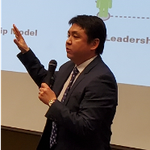[KGCCI Seminar] Informal Network Leadership in Korea
This seminar enables participants to improve their leadership competencies by further developing their networking skills in the Korean business context. Understanding the cultural context and related social structures, will help participants to uncover and identify informal network structures and utilize them, directly or indirectly, for business success. Acquired skills will help managers to align and improve their relationship management in Korea and support them in selecting viable and effective options to approach networking in a local context. The seminar will feature interactive group discussions, exercises, insights into the latest research on informal network leadership and yongo in Korean management and beyond. Skills and knowledge acquired in this seminar can be directly utilized in practice.
- Date: Tuesday, 26 July 2022
- Time: 14.00 pm-18.00 pm (KST)
- Format: Offline
- Target Group: Expatriates with 0-3 years of management experience in Korea and/or any manager with an interest in strategic informal networking in Korea
- Language: English
- Lecturer: Prof. Dr. Sven Horak, St. John's University & Prof. Dr. Jong Gyu Park, Pennsylvania State University
- Participation fee: 350,000 KRW (excl. VAT)
Major subjects to be covered are:
- Networking: A key skill for leaders
- Leadership in East Asia: Korea, China and Japan
- Networking and leadership in the East versus the West
- Traditional networking in Korea and the role of Yongo, Inmaek, Yonjul
- Networking in Korea today: Yongo 2.0 and Global Inmaek
- Yongo 2.0: Underlying social trends - Spoon-class theory and N-po generation
- Yongo 2.0 in business – chances and risks
- Ingroups – outgroups and network leadership
- Leading reactive and proactive network strategies
- Ethical and unethical approaches to networking
Please register until July 25 2022.
For inquiries and registration, please contact Ms. Eun-Hyang Cho via E-Mail ehcho@kgcci.com,
Tel. 02-37804-601.
Background:
Networking in business is often thought of as an activity that in principle everybody can and should do. However, due to different values and norm systems, the way that social ties are chosen, assumed, maintained, and deepened differs across cultures. International managers, e.g., business expatriates, are cultural outsiders, hence, compared to locals, they face barriers to networking. Consequently, a manager's social influence, which is regarded a central pillar of leadership, falls short. This seminar enables participants to improve their leadership competencies by further developing their networking skills in the Korean business context. Understanding the cultural context and related social structures, will help participants to uncover and identify informal network structures and utilize them for business success.






